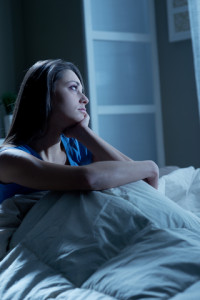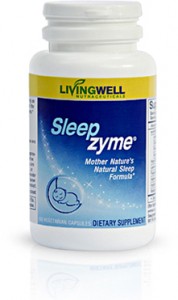 Science has shown that it causes heart disease, diabetes, obesity, and certain types of cancer … and now new research shows poor sleep can lead to Alzheimer’s, too!” Specifically poor deep sleep.
Science has shown that it causes heart disease, diabetes, obesity, and certain types of cancer … and now new research shows poor sleep can lead to Alzheimer’s, too!” Specifically poor deep sleep.
Deposits of beta-amyloid proteins in the brain are a hallmark of Alzheimer’s disease. Using brain imaging and other diagnostic tools, researchers evaluated 26 cognitively normal older adults to see if there was a link between sleep, memory and beta-amyloid protein accumulation.
Indeed, those who had disrupted sleep patterns had higher amounts of beta-amyloid buildup and worse scores on memory tests.[i] According to the study’s senior author, UC Berkeley neuroscience professor Matthew Walker:[ii]
“The more beta-amyloid you have in certain parts of your brain, the less deep sleep you get and, consequently, the worse your memory … Additionally, the less deep sleep you have, the less effective you are at clearing out this bad protein. It’s a vicious cycle.”
The “clearing out” of bad protein that Walker is referring to takes place during sleep. Previous research has shown that, during sleep, your brain’s waste-removal system – the glymphatic system – is ramped up. It literally flushes waste from your brain using cerebral spinal fluid, including waste such as the “bad” proteins linked to Alzheimer’s disease.
Your brain cells even shrink significantly (by up to 60 percent) while you sleep, which gives more room for the fluid to pass by for a thorough cleaning.[iii] [iv] Without proper sleep, your body misses out on this important detoxification tool. Walker continued:
“Sleep is helping wash away toxic proteins at night, preventing them from building up and from potentially destroying brain cells … It’s providing a power cleanse for the brain.”
The Less Sleep You Get, the More You do THIS …
Eat! It’s bad enough that missing out on crucial deep sleep may make you forgetful and prone to accumulating dementia-causing beta-amyloid in your brain. But new research also shows disrupted sleep leads to excessive food intake.[v]
When you’re sleep deprived your body produces less leptin, a hormone that curbs appetite, and more ghrelin, also known as the “hunger hormone.” When this happens, it’s not unusual for your stomach to feel like a bottomless pit.
Aside from the hormone fluctuations, poor sleep increases emotional stress and impulsivity. Meanwhile, you’ll be lacking in energy, which will further drive you to crave food as energy to compensate. In other words, your sleep patterns may heavily alter many of the major mechanisms that drive food intake, including biological, emotional and cognitive factors.[vi]
Poor Sleep Contributes to Chronic Disease
Staying up late to “burn the midnight oil” is often viewed as a sign of hard work and determination … but though you may be able to fight off the sandman your body won’t be fooled. There is no substitute for high-quality sleep, and enough of it, plain and simple. While an estimated 50-70 million U.S. adults have sleep or wakefulness disorders that contribute to poor sleep,[vii] many others lack sleep simply because they stay up too late – working, watching tv, surfing the Web, etc.
If you need some motivation to move your bedtime up an hour (or even 30 minutes), consider this: getting more sleep (especially if you average six hours or less a night) can lower your risk of chronic diseases and health conditions. Specifically:[viii]
- Sleeping fewer than six hours a night may quadruple your risk of stroke
- Cutting back on sleep increases insulin resistance in your fat cells, even if you watch your diet
- Sleep deprivation in older adults is associated with brain degeneration and memory loss[ix]
- Long-term sleep deprivation may lead to changes in bone mineral density that contribute to osteoporosis (although this was an animal study, the researchers suspect similar may occur in humans)[x]
- Sleeping fewer than six hours a night has been linked to both colorectal and breast cancers
- Those who sleep six hours or less a night have a 48 percent increased risk of heart disease[xi]
- Sleeping for less than six hours may increase your risk of dying from any cause by four-fold[xii]
Do YOU Need More Sleep?
Of all the things you’re called upon to do for your health – eat right, exercise, avoid stress and the like – getting proper sleep is arguably the easiest. If you’re having trouble sleeping, look at the obvious deterrents first. Is your bedroom conducive to sleep? Is it quiet, cool and dark? Do you bring your phone or laptop to bed? Are you staying up late streaming your favorite shows?
Once you’ve covered the basics, strive to have a set bedtime and wake-up time, which helps keep your body clock in sync. Regular exercise has also been shown to improve sleep quality, mood and quality of life in people with insomnia.[xiii]
Finally, don’t be hesitant to give your body a little help. You can sleep better the very first night you try Sleepzyme, which contains the natural sedative Valerian plus nine other proven, all-natural sleep aids. This includes:
- Magnesium citrate to boost and activate your ‘sleep hormone’ (melatonin)
- GABA, which improves your most vital state of sleep (the delta phase)
- 5-HTTP to help your body make serotonin and melatonin
- Inositol, which helps you stay asleep longer and have fewer bad dreams
- L-Theanine, which helps you relax and fall asleep with ease
- Lemon balm leaf to reduce anxiety and improve sleep
- Hops flower, which contains a naturally occurring sedative
- Passion flower, which is also recognized as an herbal sedative
- Melatonin to help regulate your sleep cycle (i.e. your circadian rhythm)
It also contains a special blend of enzymes uniquely formulated to improve the effectiveness of the botanical ingredients. If you’re serious about getting proper sleep, there’s no better solution on the market. Sleepzyme is mother-nature-approved. It’s all natural, non-addictive and has no negative side effects. Just take 3 capsules approximately one hour before bed each night with an 8 oz. glass of water and let nature do the rest.
[i] Nature Neuroscience June 1, 2015
[ii] Science Daily June 1, 2015
[iii] Science 18 October 2013: 342(6156); 373-377
[iv] National Institutes of Health October 17, 2013
[v] J Health Psychol June 2015 vol. 20 no. 6 794-805
[vi] Science Daily June 1, 2015
[vii] U.S. CDC, Insufficient Sleep is a Public Health Epidemic
[viii] Huffington Post September 18, 2014
[ix] Nature Neuroscience 16, 357–364 (2013)
[x] Exp Biol Med (Maywood) September 2012 237: 1101-1109
[xi] European Heart Journal February 8, 2011
[xii] Sleep, Volume 33, Issue 09
[xiii] Sleep Med. Oct 2010; 11(9): 934-940



Jesse,
Before I get a free bottle of this product,
than, l try but can’t sleep ,l don’t know.
Why …
Yen, there are many different reasons why people have a hard time sleeping, here is and article that reviews 15 different reasons, please read it and try to use the process of elimination to help you figure out your reasons:
https://losethebackpain.com/blog/2011/11/07/pain-and-sleep/
Further, we support the use of natural sleep aids to get people back on track with their sleep, I have been taking natural sleep aids for more then 25 years, as I put sleep at one of the most important things we do as humans, and I now come to expect great sleep, every night, even when traveling…
Steve, Co-founder of the HBI